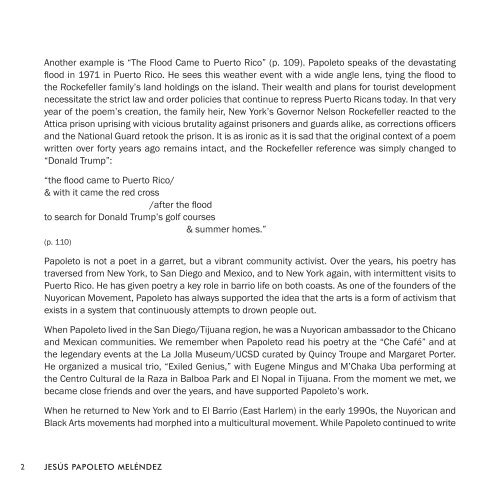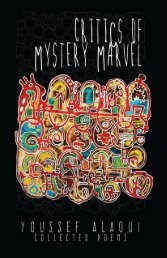PAPOLíTICO, Poems of a Political Puersuasion by Jesús Papoleto Meléndez
PAPOLíTICO, POEMS OF A POLITICAL PERSUASION is award-winning poet Jesús Papoleto Meléndez’ sixth book of poetry. Witty, wise, personal and political, Meléndez, often weary of the social issues and politics of the day, has created an exciting compilation of new and previously published poems in a collection that he has daringly named after himself to nudge people out of complacency. PAPOLíTICO is a poetic call for tolerance, reflection, reconciliation, and healing.
PAPOLíTICO, POEMS OF A POLITICAL PERSUASION is award-winning poet Jesús Papoleto Meléndez’ sixth book of poetry. Witty, wise, personal and political, Meléndez, often weary of the social issues and politics of the day, has created an exciting compilation of new and previously published poems in a collection that he has daringly named after himself to nudge people out of complacency. PAPOLíTICO is a poetic call for tolerance, reflection, reconciliation, and healing.
You also want an ePaper? Increase the reach of your titles
YUMPU automatically turns print PDFs into web optimized ePapers that Google loves.
Another example is “The Flood Came to Puerto Rico” (p. 109). <strong>Papoleto</strong> speaks <strong>of</strong> the devastating<br />
flood in 1971 in Puerto Rico. He sees this weather event with a wide angle lens, tying the flood to<br />
the Rockefeller family’s land holdings on the island. Their wealth and plans for tourist development<br />
necessitate the strict law and order policies that continue to repress Puerto Ricans today. In that very<br />
year <strong>of</strong> the poem’s creation, the family heir, New York’s Governor Nelson Rockefeller reacted to the<br />
Attica prison uprising with vicious brutality against prisoners and guards alike, as corrections <strong>of</strong>ficers<br />
and the National Guard retook the prison. It is as ironic as it is sad that the original context <strong>of</strong> a poem<br />
written over forty years ago remains intact, and the Rockefeller reference was simply changed to<br />
“Donald Trump”:<br />
“the flood came to Puerto Rico/<br />
& with it came the red cross<br />
/after the flood<br />
to search for Donald Trump’s golf courses<br />
& summer homes.”<br />
(p. 110)<br />
<strong>Papoleto</strong> is not a poet in a garret, but a vibrant community activist. Over the years, his poetry has<br />
traversed from New York, to San Diego and Mexico, and to New York again, with intermittent visits to<br />
Puerto Rico. He has given poetry a key role in barrio life on both coasts. As one <strong>of</strong> the founders <strong>of</strong> the<br />
Nuyorican Movement, <strong>Papoleto</strong> has always supported the idea that the arts is a form <strong>of</strong> activism that<br />
exists in a system that continuously attempts to drown people out.<br />
When <strong>Papoleto</strong> lived in the San Diego/Tijuana region, he was a Nuyorican ambassador to the Chicano<br />
and Mexican communities. We remember when <strong>Papoleto</strong> read his poetry at the “Che Café” and at<br />
the legendary events at the La Jolla Museum/UCSD curated <strong>by</strong> Quincy Troupe and Margaret Porter.<br />
He organized a musical trio, “Exiled Genius,” with Eugene Mingus and M’Chaka Uba performing at<br />
the Centro Cultural de la Raza in Balboa Park and El Nopal in Tijuana. From the moment we met, we<br />
became close friends and over the years, and have supported <strong>Papoleto</strong>’s work.<br />
When he returned to New York and to El Barrio (East Harlem) in the early 1990s, the Nuyorican and<br />
Black Arts movements had morphed into a multicultural movement. While <strong>Papoleto</strong> continued to write<br />
2<br />
JESÚS PAPOLETO MELÉNDEZ






